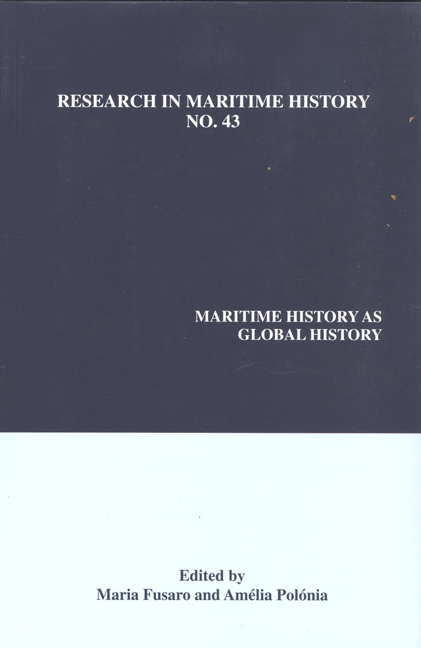Book contents
- Frontmatter
- Contents
- About the Editors
- Contributors' Notes
- “Maritime History: A Gateway to Global History?”
- “Behind the Atlantic Expansion: Flemish Trade Connections of Seville in 1620”
- “National and International Labour Markets for Sailors in European, Atlantic and Asian Waters, 1600-1850”
- “Maritime Expansion and (De)globalization? An Examination of the Land and Sea Trade in Seventeenth-Century Mughal India”
- “From Hold to Foredeck: Slave Professions in the Maritime World of the East India Company, c. 1660-1720”
- “Small Town Merchants, Global Ventures: The Maritime Trade of the New Julfan Armenians in the Seventeenth and Eighteenth Centuries”
- “Lighting up the World? Empires and Islanders in the Pacific Whaling Industry, 1790-1860”
- “Technological Advances in the Maritime Sector: Some Implications for Trade, Modernization and the Process of Globalization in the Nineteenth Century”
- “Lost in Calculation? Norwegian Merchant Shipping in Asia, 1870-1914”
- “Why Are the Major Oil Companies Selling Off their Fleets? The Case of Total”
- “Turning Maritime History into Global History: Some Conclusions from the Impact of Globalization in Early Modern Spain”
- “Maritime History as Global History? The Methodological Challenges and a Future Research Agenda”
“Maritime History: A Gateway to Global History?”
- Frontmatter
- Contents
- About the Editors
- Contributors' Notes
- “Maritime History: A Gateway to Global History?”
- “Behind the Atlantic Expansion: Flemish Trade Connections of Seville in 1620”
- “National and International Labour Markets for Sailors in European, Atlantic and Asian Waters, 1600-1850”
- “Maritime Expansion and (De)globalization? An Examination of the Land and Sea Trade in Seventeenth-Century Mughal India”
- “From Hold to Foredeck: Slave Professions in the Maritime World of the East India Company, c. 1660-1720”
- “Small Town Merchants, Global Ventures: The Maritime Trade of the New Julfan Armenians in the Seventeenth and Eighteenth Centuries”
- “Lighting up the World? Empires and Islanders in the Pacific Whaling Industry, 1790-1860”
- “Technological Advances in the Maritime Sector: Some Implications for Trade, Modernization and the Process of Globalization in the Nineteenth Century”
- “Lost in Calculation? Norwegian Merchant Shipping in Asia, 1870-1914”
- “Why Are the Major Oil Companies Selling Off their Fleets? The Case of Total”
- “Turning Maritime History into Global History: Some Conclusions from the Impact of Globalization in Early Modern Spain”
- “Maritime History as Global History? The Methodological Challenges and a Future Research Agenda”
Summary
This volume seeks to contribute new insights to current debates about the scope of maritime history and its connections with global history. It comprises a set of studies on various themes, time periods and geographical areas, using diverse methodologies and theoretical frameworks, but with a common topic: a discussion of the global impact of maritime dynamics.
Since maritime history in its economic, social, cultural, environmental and political dimensions contributes actively to world history, this collection intends to highlight maritime history as a major agent for broad global exchange, focusing on interdependencies which fostered connections on the local, national and global levels from the fifteenth to the twentieth centuries. To meet this goal, the book includes papers covering both a broad spatial and chronological scope and diverse sub-fields of maritime historical research.
The intellectual conception of the volume is two-fold. On the one hand, it shows how maritime dynamics created global exchanges in the sense that they generated phenomena that had global impacts. The ultimate example might be the European maritime expansion between 1500 and 1800 which served as a catalyst for launching a world economic system which eventually led to the “First Global Age,” a subject that is still under discussion and demands further research. On the other hand, we believe that maritime history in its broadest sense is global in the sense of a “total history,” a hypothesis supported by a good deal of evidence.
Maritime history in its widest sense is usually understood as a field of research which encompasses all the dynamics which result from, and are required by, the ways humans use the sea. In this sense, maritime history cannot be confined to a specific field of historical research. Rather, it often crosses the boundaries of other disciplines and fields of research, and indeed goes beyond the limits of history. Understanding the historical development of fisheries requires the study of sea resources and an analysis of the sustainability of eco-systems, thereby involving disciplines such as biology, climatology, ecology and environmental science. Studies on maritime accessibility draw on insights from geography, geomorphology and engineering. Studying seafaring or fishing communities necessitates theoretical and methodological inputs from anthropology, sociology and even the behavioural sciences. Analyzing the distribution of maritime populations involves demographic studies.
- Type
- Chapter
- Information
- Maritime History as Global History , pp. 1 - 20Publisher: Liverpool University PressPrint publication year: 2010



